Organisational Behaviour: Culture, Politics, and Power at M&S Report
VerifiedAdded on 2023/01/19
|19
|6659
|79
Report
AI Summary
This report provides an in-depth analysis of organisational behaviour, focusing on the influence of culture, politics, and power on individual and team performance, using Marks & Spencer as a case study. It explores Handy's model of organisational culture, examining power, role, task, and person cultures, and how each impacts team dynamics. The report also delves into workplace politics, identifying its negative impacts on stress, productivity, and employee focus, while also exploring the French and Raven's Power model, including expert, legitimate, coercive, reward, and referent power. Furthermore, the report evaluates content and process theories of motivation, and discusses what constitutes an effective versus ineffective team, along with relevant team and group development theories. Finally, it applies concepts and philosophies of organisational behaviour, evaluating how they inform and influence behaviour, both positively and negatively, to provide a comprehensive understanding of the subject matter.
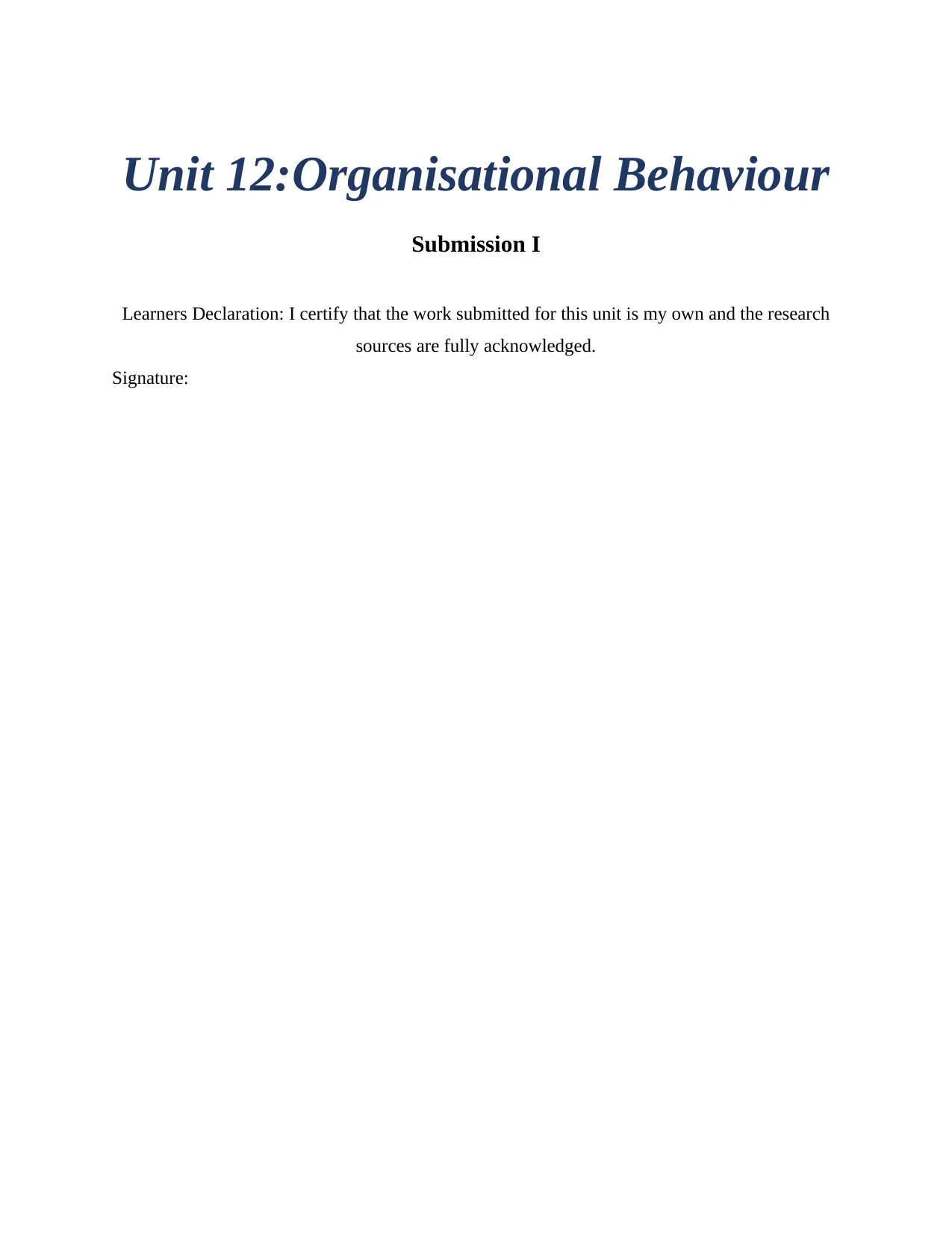
Unit 12:Organisational Behaviour
Submission I
Learners Declaration: I certify that the work submitted for this unit is my own and the research
sources are fully acknowledged.
Signature:
Submission I
Learners Declaration: I certify that the work submitted for this unit is my own and the research
sources are fully acknowledged.
Signature:
Paraphrase This Document
Need a fresh take? Get an instant paraphrase of this document with our AI Paraphraser
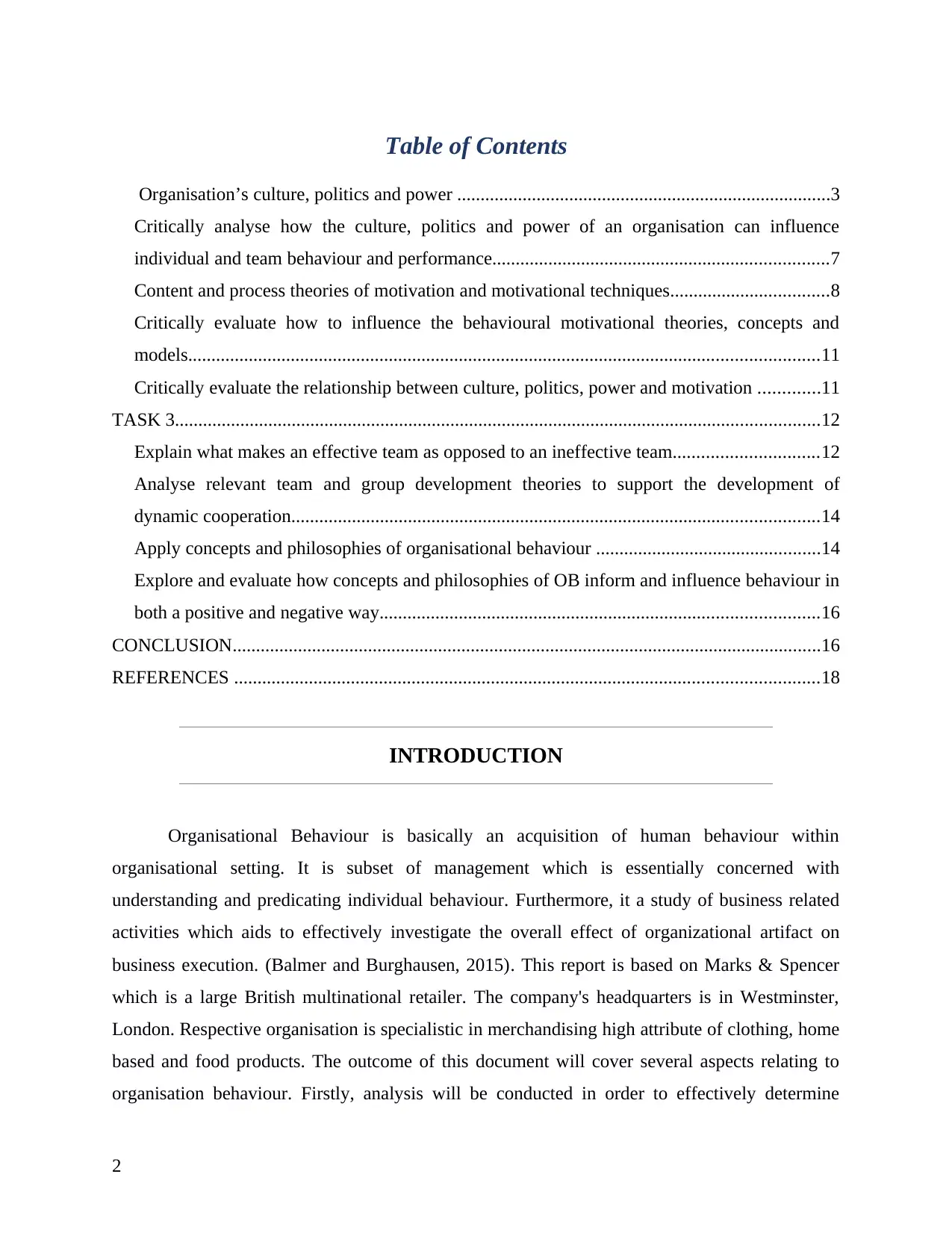
Table of Contents
Organisation’s culture, politics and power ................................................................................3
Critically analyse how the culture, politics and power of an organisation can influence
individual and team behaviour and performance........................................................................7
Content and process theories of motivation and motivational techniques..................................8
Critically evaluate how to influence the behavioural motivational theories, concepts and
models.......................................................................................................................................11
Critically evaluate the relationship between culture, politics, power and motivation .............11
TASK 3..........................................................................................................................................12
Explain what makes an effective team as opposed to an ineffective team...............................12
Analyse relevant team and group development theories to support the development of
dynamic cooperation.................................................................................................................14
Apply concepts and philosophies of organisational behaviour ................................................14
Explore and evaluate how concepts and philosophies of OB inform and influence behaviour in
both a positive and negative way..............................................................................................16
CONCLUSION..............................................................................................................................16
REFERENCES .............................................................................................................................18
INTRODUCTION
Organisational Behaviour is basically an acquisition of human behaviour within
organisational setting. It is subset of management which is essentially concerned with
understanding and predicating individual behaviour. Furthermore, it a study of business related
activities which aids to effectively investigate the overall effect of organizational artifact on
business execution. (Balmer and Burghausen, 2015). This report is based on Marks & Spencer
which is a large British multinational retailer. The company's headquarters is in Westminster,
London. Respective organisation is specialistic in merchandising high attribute of clothing, home
based and food products. The outcome of this document will cover several aspects relating to
organisation behaviour. Firstly, analysis will be conducted in order to effectively determine
2
Organisation’s culture, politics and power ................................................................................3
Critically analyse how the culture, politics and power of an organisation can influence
individual and team behaviour and performance........................................................................7
Content and process theories of motivation and motivational techniques..................................8
Critically evaluate how to influence the behavioural motivational theories, concepts and
models.......................................................................................................................................11
Critically evaluate the relationship between culture, politics, power and motivation .............11
TASK 3..........................................................................................................................................12
Explain what makes an effective team as opposed to an ineffective team...............................12
Analyse relevant team and group development theories to support the development of
dynamic cooperation.................................................................................................................14
Apply concepts and philosophies of organisational behaviour ................................................14
Explore and evaluate how concepts and philosophies of OB inform and influence behaviour in
both a positive and negative way..............................................................................................16
CONCLUSION..............................................................................................................................16
REFERENCES .............................................................................................................................18
INTRODUCTION
Organisational Behaviour is basically an acquisition of human behaviour within
organisational setting. It is subset of management which is essentially concerned with
understanding and predicating individual behaviour. Furthermore, it a study of business related
activities which aids to effectively investigate the overall effect of organizational artifact on
business execution. (Balmer and Burghausen, 2015). This report is based on Marks & Spencer
which is a large British multinational retailer. The company's headquarters is in Westminster,
London. Respective organisation is specialistic in merchandising high attribute of clothing, home
based and food products. The outcome of this document will cover several aspects relating to
organisation behaviour. Firstly, analysis will be conducted in order to effectively determine
2
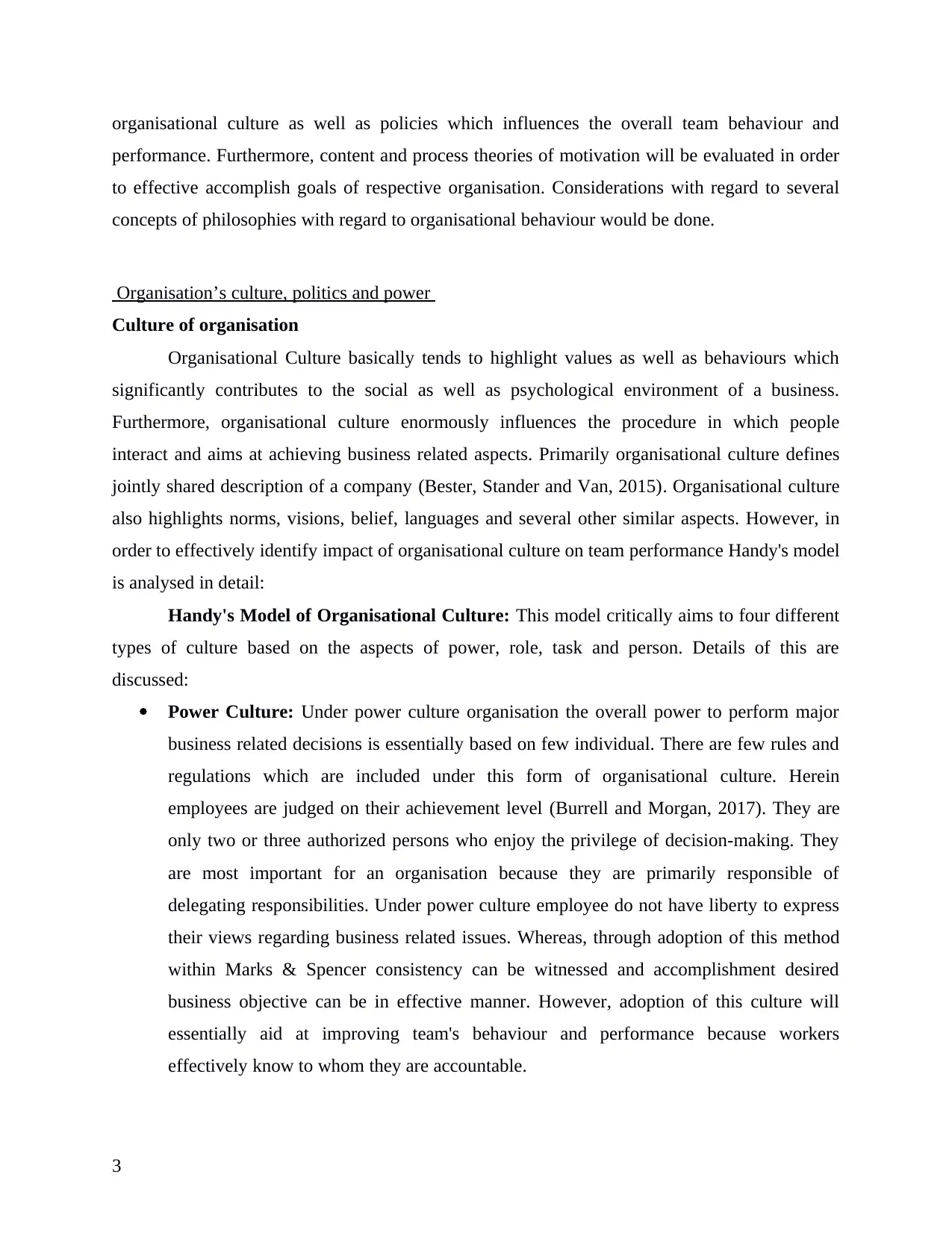
organisational culture as well as policies which influences the overall team behaviour and
performance. Furthermore, content and process theories of motivation will be evaluated in order
to effective accomplish goals of respective organisation. Considerations with regard to several
concepts of philosophies with regard to organisational behaviour would be done.
Organisation’s culture, politics and power
Culture of organisation
Organisational Culture basically tends to highlight values as well as behaviours which
significantly contributes to the social as well as psychological environment of a business.
Furthermore, organisational culture enormously influences the procedure in which people
interact and aims at achieving business related aspects. Primarily organisational culture defines
jointly shared description of a company (Bester, Stander and Van, 2015). Organisational culture
also highlights norms, visions, belief, languages and several other similar aspects. However, in
order to effectively identify impact of organisational culture on team performance Handy's model
is analysed in detail:
Handy's Model of Organisational Culture: This model critically aims to four different
types of culture based on the aspects of power, role, task and person. Details of this are
discussed:
Power Culture: Under power culture organisation the overall power to perform major
business related decisions is essentially based on few individual. There are few rules and
regulations which are included under this form of organisational culture. Herein
employees are judged on their achievement level (Burrell and Morgan, 2017). They are
only two or three authorized persons who enjoy the privilege of decision-making. They
are most important for an organisation because they are primarily responsible of
delegating responsibilities. Under power culture employee do not have liberty to express
their views regarding business related issues. Whereas, through adoption of this method
within Marks & Spencer consistency can be witnessed and accomplishment desired
business objective can be in effective manner. However, adoption of this culture will
essentially aid at improving team's behaviour and performance because workers
effectively know to whom they are accountable.
3
performance. Furthermore, content and process theories of motivation will be evaluated in order
to effective accomplish goals of respective organisation. Considerations with regard to several
concepts of philosophies with regard to organisational behaviour would be done.
Organisation’s culture, politics and power
Culture of organisation
Organisational Culture basically tends to highlight values as well as behaviours which
significantly contributes to the social as well as psychological environment of a business.
Furthermore, organisational culture enormously influences the procedure in which people
interact and aims at achieving business related aspects. Primarily organisational culture defines
jointly shared description of a company (Bester, Stander and Van, 2015). Organisational culture
also highlights norms, visions, belief, languages and several other similar aspects. However, in
order to effectively identify impact of organisational culture on team performance Handy's model
is analysed in detail:
Handy's Model of Organisational Culture: This model critically aims to four different
types of culture based on the aspects of power, role, task and person. Details of this are
discussed:
Power Culture: Under power culture organisation the overall power to perform major
business related decisions is essentially based on few individual. There are few rules and
regulations which are included under this form of organisational culture. Herein
employees are judged on their achievement level (Burrell and Morgan, 2017). They are
only two or three authorized persons who enjoy the privilege of decision-making. They
are most important for an organisation because they are primarily responsible of
delegating responsibilities. Under power culture employee do not have liberty to express
their views regarding business related issues. Whereas, through adoption of this method
within Marks & Spencer consistency can be witnessed and accomplishment desired
business objective can be in effective manner. However, adoption of this culture will
essentially aid at improving team's behaviour and performance because workers
effectively know to whom they are accountable.
3
⊘ This is a preview!⊘
Do you want full access?
Subscribe today to unlock all pages.

Trusted by 1+ million students worldwide
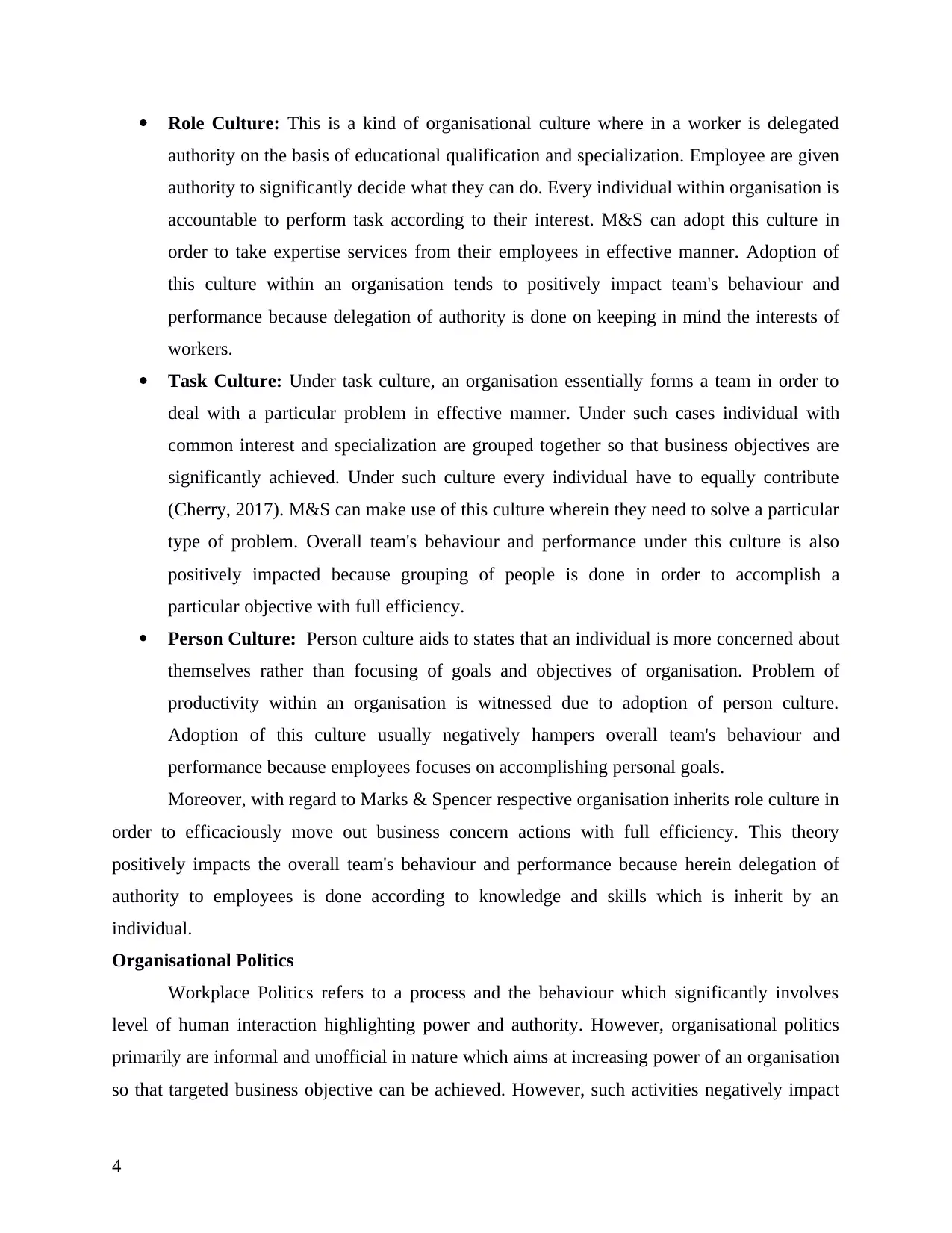
Role Culture: This is a kind of organisational culture where in a worker is delegated
authority on the basis of educational qualification and specialization. Employee are given
authority to significantly decide what they can do. Every individual within organisation is
accountable to perform task according to their interest. M&S can adopt this culture in
order to take expertise services from their employees in effective manner. Adoption of
this culture within an organisation tends to positively impact team's behaviour and
performance because delegation of authority is done on keeping in mind the interests of
workers.
Task Culture: Under task culture, an organisation essentially forms a team in order to
deal with a particular problem in effective manner. Under such cases individual with
common interest and specialization are grouped together so that business objectives are
significantly achieved. Under such culture every individual have to equally contribute
(Cherry, 2017). M&S can make use of this culture wherein they need to solve a particular
type of problem. Overall team's behaviour and performance under this culture is also
positively impacted because grouping of people is done in order to accomplish a
particular objective with full efficiency.
Person Culture: Person culture aids to states that an individual is more concerned about
themselves rather than focusing of goals and objectives of organisation. Problem of
productivity within an organisation is witnessed due to adoption of person culture.
Adoption of this culture usually negatively hampers overall team's behaviour and
performance because employees focuses on accomplishing personal goals.
Moreover, with regard to Marks & Spencer respective organisation inherits role culture in
order to efficaciously move out business concern actions with full efficiency. This theory
positively impacts the overall team's behaviour and performance because herein delegation of
authority to employees is done according to knowledge and skills which is inherit by an
individual.
Organisational Politics
Workplace Politics refers to a process and the behaviour which significantly involves
level of human interaction highlighting power and authority. However, organisational politics
primarily are informal and unofficial in nature which aims at increasing power of an organisation
so that targeted business objective can be achieved. However, such activities negatively impact
4
authority on the basis of educational qualification and specialization. Employee are given
authority to significantly decide what they can do. Every individual within organisation is
accountable to perform task according to their interest. M&S can adopt this culture in
order to take expertise services from their employees in effective manner. Adoption of
this culture within an organisation tends to positively impact team's behaviour and
performance because delegation of authority is done on keeping in mind the interests of
workers.
Task Culture: Under task culture, an organisation essentially forms a team in order to
deal with a particular problem in effective manner. Under such cases individual with
common interest and specialization are grouped together so that business objectives are
significantly achieved. Under such culture every individual have to equally contribute
(Cherry, 2017). M&S can make use of this culture wherein they need to solve a particular
type of problem. Overall team's behaviour and performance under this culture is also
positively impacted because grouping of people is done in order to accomplish a
particular objective with full efficiency.
Person Culture: Person culture aids to states that an individual is more concerned about
themselves rather than focusing of goals and objectives of organisation. Problem of
productivity within an organisation is witnessed due to adoption of person culture.
Adoption of this culture usually negatively hampers overall team's behaviour and
performance because employees focuses on accomplishing personal goals.
Moreover, with regard to Marks & Spencer respective organisation inherits role culture in
order to efficaciously move out business concern actions with full efficiency. This theory
positively impacts the overall team's behaviour and performance because herein delegation of
authority to employees is done according to knowledge and skills which is inherit by an
individual.
Organisational Politics
Workplace Politics refers to a process and the behaviour which significantly involves
level of human interaction highlighting power and authority. However, organisational politics
primarily are informal and unofficial in nature which aims at increasing power of an organisation
so that targeted business objective can be achieved. However, such activities negatively impact
4
Paraphrase This Document
Need a fresh take? Get an instant paraphrase of this document with our AI Paraphraser
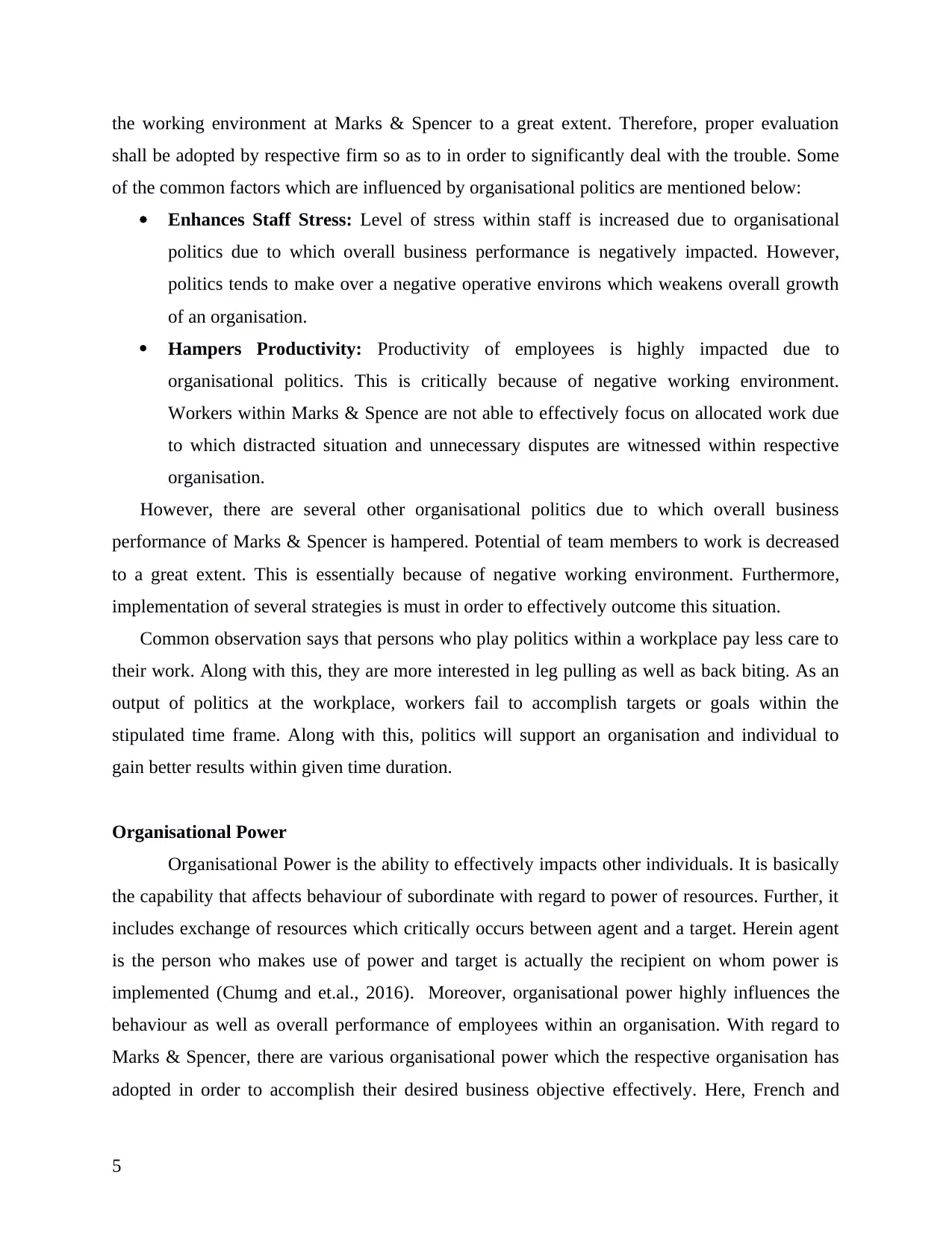
the working environment at Marks & Spencer to a great extent. Therefore, proper evaluation
shall be adopted by respective firm so as to in order to significantly deal with the trouble. Some
of the common factors which are influenced by organisational politics are mentioned below:
Enhances Staff Stress: Level of stress within staff is increased due to organisational
politics due to which overall business performance is negatively impacted. However,
politics tends to make over a negative operative environs which weakens overall growth
of an organisation.
Hampers Productivity: Productivity of employees is highly impacted due to
organisational politics. This is critically because of negative working environment.
Workers within Marks & Spence are not able to effectively focus on allocated work due
to which distracted situation and unnecessary disputes are witnessed within respective
organisation.
However, there are several other organisational politics due to which overall business
performance of Marks & Spencer is hampered. Potential of team members to work is decreased
to a great extent. This is essentially because of negative working environment. Furthermore,
implementation of several strategies is must in order to effectively outcome this situation.
Common observation says that persons who play politics within a workplace pay less care to
their work. Along with this, they are more interested in leg pulling as well as back biting. As an
output of politics at the workplace, workers fail to accomplish targets or goals within the
stipulated time frame. Along with this, politics will support an organisation and individual to
gain better results within given time duration.
Organisational Power
Organisational Power is the ability to effectively impacts other individuals. It is basically
the capability that affects behaviour of subordinate with regard to power of resources. Further, it
includes exchange of resources which critically occurs between agent and a target. Herein agent
is the person who makes use of power and target is actually the recipient on whom power is
implemented (Chumg and et.al., 2016). Moreover, organisational power highly influences the
behaviour as well as overall performance of employees within an organisation. With regard to
Marks & Spencer, there are various organisational power which the respective organisation has
adopted in order to accomplish their desired business objective effectively. Here, French and
5
shall be adopted by respective firm so as to in order to significantly deal with the trouble. Some
of the common factors which are influenced by organisational politics are mentioned below:
Enhances Staff Stress: Level of stress within staff is increased due to organisational
politics due to which overall business performance is negatively impacted. However,
politics tends to make over a negative operative environs which weakens overall growth
of an organisation.
Hampers Productivity: Productivity of employees is highly impacted due to
organisational politics. This is critically because of negative working environment.
Workers within Marks & Spence are not able to effectively focus on allocated work due
to which distracted situation and unnecessary disputes are witnessed within respective
organisation.
However, there are several other organisational politics due to which overall business
performance of Marks & Spencer is hampered. Potential of team members to work is decreased
to a great extent. This is essentially because of negative working environment. Furthermore,
implementation of several strategies is must in order to effectively outcome this situation.
Common observation says that persons who play politics within a workplace pay less care to
their work. Along with this, they are more interested in leg pulling as well as back biting. As an
output of politics at the workplace, workers fail to accomplish targets or goals within the
stipulated time frame. Along with this, politics will support an organisation and individual to
gain better results within given time duration.
Organisational Power
Organisational Power is the ability to effectively impacts other individuals. It is basically
the capability that affects behaviour of subordinate with regard to power of resources. Further, it
includes exchange of resources which critically occurs between agent and a target. Herein agent
is the person who makes use of power and target is actually the recipient on whom power is
implemented (Chumg and et.al., 2016). Moreover, organisational power highly influences the
behaviour as well as overall performance of employees within an organisation. With regard to
Marks & Spencer, there are various organisational power which the respective organisation has
adopted in order to accomplish their desired business objective effectively. Here, French and
5
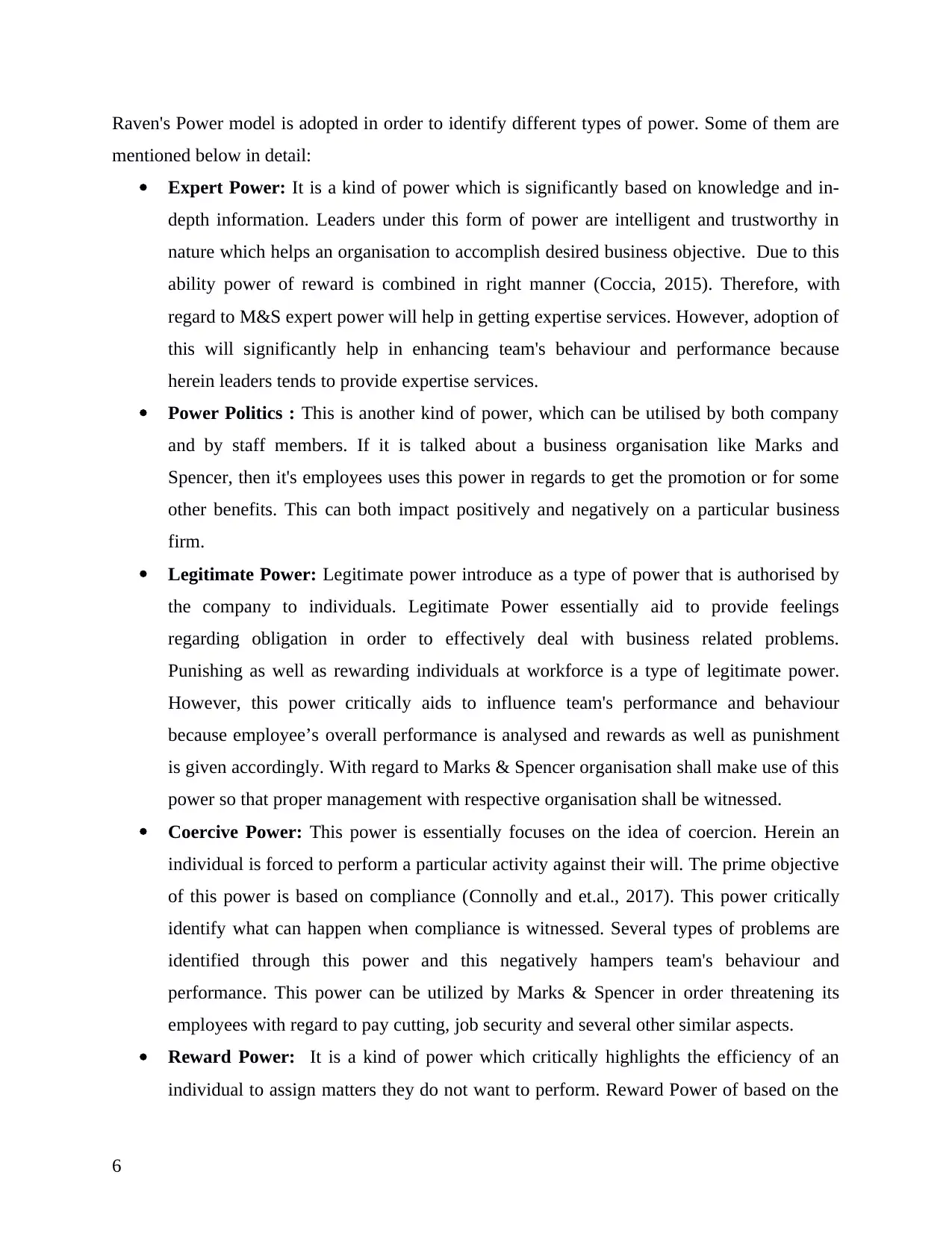
Raven's Power model is adopted in order to identify different types of power. Some of them are
mentioned below in detail:
Expert Power: It is a kind of power which is significantly based on knowledge and in-
depth information. Leaders under this form of power are intelligent and trustworthy in
nature which helps an organisation to accomplish desired business objective. Due to this
ability power of reward is combined in right manner (Coccia, 2015). Therefore, with
regard to M&S expert power will help in getting expertise services. However, adoption of
this will significantly help in enhancing team's behaviour and performance because
herein leaders tends to provide expertise services.
Power Politics : This is another kind of power, which can be utilised by both company
and by staff members. If it is talked about a business organisation like Marks and
Spencer, then it's employees uses this power in regards to get the promotion or for some
other benefits. This can both impact positively and negatively on a particular business
firm.
Legitimate Power: Legitimate power introduce as a type of power that is authorised by
the company to individuals. Legitimate Power essentially aid to provide feelings
regarding obligation in order to effectively deal with business related problems.
Punishing as well as rewarding individuals at workforce is a type of legitimate power.
However, this power critically aids to influence team's performance and behaviour
because employee’s overall performance is analysed and rewards as well as punishment
is given accordingly. With regard to Marks & Spencer organisation shall make use of this
power so that proper management with respective organisation shall be witnessed.
Coercive Power: This power is essentially focuses on the idea of coercion. Herein an
individual is forced to perform a particular activity against their will. The prime objective
of this power is based on compliance (Connolly and et.al., 2017). This power critically
identify what can happen when compliance is witnessed. Several types of problems are
identified through this power and this negatively hampers team's behaviour and
performance. This power can be utilized by Marks & Spencer in order threatening its
employees with regard to pay cutting, job security and several other similar aspects.
Reward Power: It is a kind of power which critically highlights the efficiency of an
individual to assign matters they do not want to perform. Reward Power of based on the
6
mentioned below in detail:
Expert Power: It is a kind of power which is significantly based on knowledge and in-
depth information. Leaders under this form of power are intelligent and trustworthy in
nature which helps an organisation to accomplish desired business objective. Due to this
ability power of reward is combined in right manner (Coccia, 2015). Therefore, with
regard to M&S expert power will help in getting expertise services. However, adoption of
this will significantly help in enhancing team's behaviour and performance because
herein leaders tends to provide expertise services.
Power Politics : This is another kind of power, which can be utilised by both company
and by staff members. If it is talked about a business organisation like Marks and
Spencer, then it's employees uses this power in regards to get the promotion or for some
other benefits. This can both impact positively and negatively on a particular business
firm.
Legitimate Power: Legitimate power introduce as a type of power that is authorised by
the company to individuals. Legitimate Power essentially aid to provide feelings
regarding obligation in order to effectively deal with business related problems.
Punishing as well as rewarding individuals at workforce is a type of legitimate power.
However, this power critically aids to influence team's performance and behaviour
because employee’s overall performance is analysed and rewards as well as punishment
is given accordingly. With regard to Marks & Spencer organisation shall make use of this
power so that proper management with respective organisation shall be witnessed.
Coercive Power: This power is essentially focuses on the idea of coercion. Herein an
individual is forced to perform a particular activity against their will. The prime objective
of this power is based on compliance (Connolly and et.al., 2017). This power critically
identify what can happen when compliance is witnessed. Several types of problems are
identified through this power and this negatively hampers team's behaviour and
performance. This power can be utilized by Marks & Spencer in order threatening its
employees with regard to pay cutting, job security and several other similar aspects.
Reward Power: It is a kind of power which critically highlights the efficiency of an
individual to assign matters they do not want to perform. Reward Power of based on the
6
⊘ This is a preview!⊘
Do you want full access?
Subscribe today to unlock all pages.

Trusted by 1+ million students worldwide
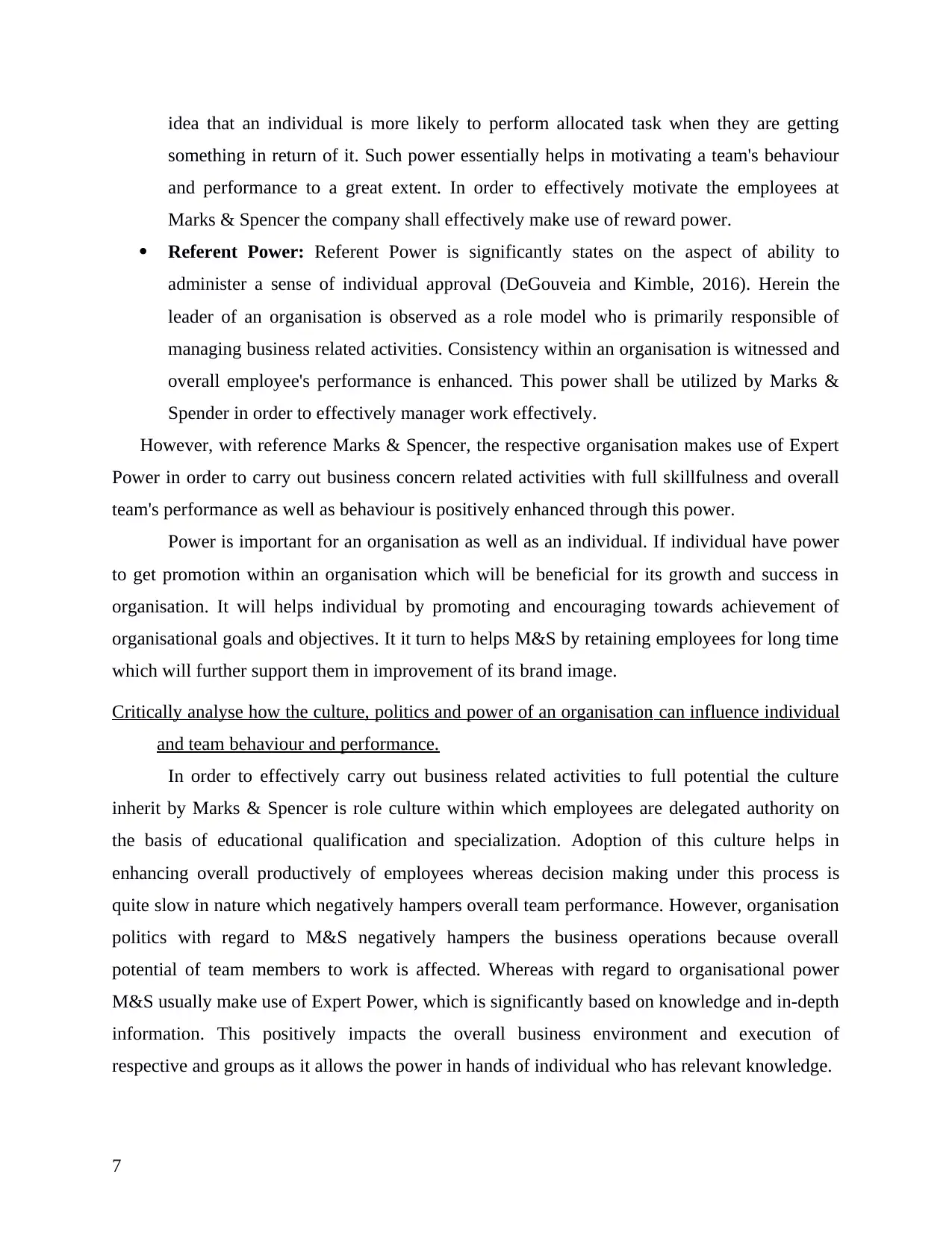
idea that an individual is more likely to perform allocated task when they are getting
something in return of it. Such power essentially helps in motivating a team's behaviour
and performance to a great extent. In order to effectively motivate the employees at
Marks & Spencer the company shall effectively make use of reward power.
Referent Power: Referent Power is significantly states on the aspect of ability to
administer a sense of individual approval (DeGouveia and Kimble, 2016). Herein the
leader of an organisation is observed as a role model who is primarily responsible of
managing business related activities. Consistency within an organisation is witnessed and
overall employee's performance is enhanced. This power shall be utilized by Marks &
Spender in order to effectively manager work effectively.
However, with reference Marks & Spencer, the respective organisation makes use of Expert
Power in order to carry out business concern related activities with full skillfulness and overall
team's performance as well as behaviour is positively enhanced through this power.
Power is important for an organisation as well as an individual. If individual have power
to get promotion within an organisation which will be beneficial for its growth and success in
organisation. It will helps individual by promoting and encouraging towards achievement of
organisational goals and objectives. It it turn to helps M&S by retaining employees for long time
which will further support them in improvement of its brand image.
Critically analyse how the culture, politics and power of an organisation can influence individual
and team behaviour and performance.
In order to effectively carry out business related activities to full potential the culture
inherit by Marks & Spencer is role culture within which employees are delegated authority on
the basis of educational qualification and specialization. Adoption of this culture helps in
enhancing overall productively of employees whereas decision making under this process is
quite slow in nature which negatively hampers overall team performance. However, organisation
politics with regard to M&S negatively hampers the business operations because overall
potential of team members to work is affected. Whereas with regard to organisational power
M&S usually make use of Expert Power, which is significantly based on knowledge and in-depth
information. This positively impacts the overall business environment and execution of
respective and groups as it allows the power in hands of individual who has relevant knowledge.
7
something in return of it. Such power essentially helps in motivating a team's behaviour
and performance to a great extent. In order to effectively motivate the employees at
Marks & Spencer the company shall effectively make use of reward power.
Referent Power: Referent Power is significantly states on the aspect of ability to
administer a sense of individual approval (DeGouveia and Kimble, 2016). Herein the
leader of an organisation is observed as a role model who is primarily responsible of
managing business related activities. Consistency within an organisation is witnessed and
overall employee's performance is enhanced. This power shall be utilized by Marks &
Spender in order to effectively manager work effectively.
However, with reference Marks & Spencer, the respective organisation makes use of Expert
Power in order to carry out business concern related activities with full skillfulness and overall
team's performance as well as behaviour is positively enhanced through this power.
Power is important for an organisation as well as an individual. If individual have power
to get promotion within an organisation which will be beneficial for its growth and success in
organisation. It will helps individual by promoting and encouraging towards achievement of
organisational goals and objectives. It it turn to helps M&S by retaining employees for long time
which will further support them in improvement of its brand image.
Critically analyse how the culture, politics and power of an organisation can influence individual
and team behaviour and performance.
In order to effectively carry out business related activities to full potential the culture
inherit by Marks & Spencer is role culture within which employees are delegated authority on
the basis of educational qualification and specialization. Adoption of this culture helps in
enhancing overall productively of employees whereas decision making under this process is
quite slow in nature which negatively hampers overall team performance. However, organisation
politics with regard to M&S negatively hampers the business operations because overall
potential of team members to work is affected. Whereas with regard to organisational power
M&S usually make use of Expert Power, which is significantly based on knowledge and in-depth
information. This positively impacts the overall business environment and execution of
respective and groups as it allows the power in hands of individual who has relevant knowledge.
7
Paraphrase This Document
Need a fresh take? Get an instant paraphrase of this document with our AI Paraphraser
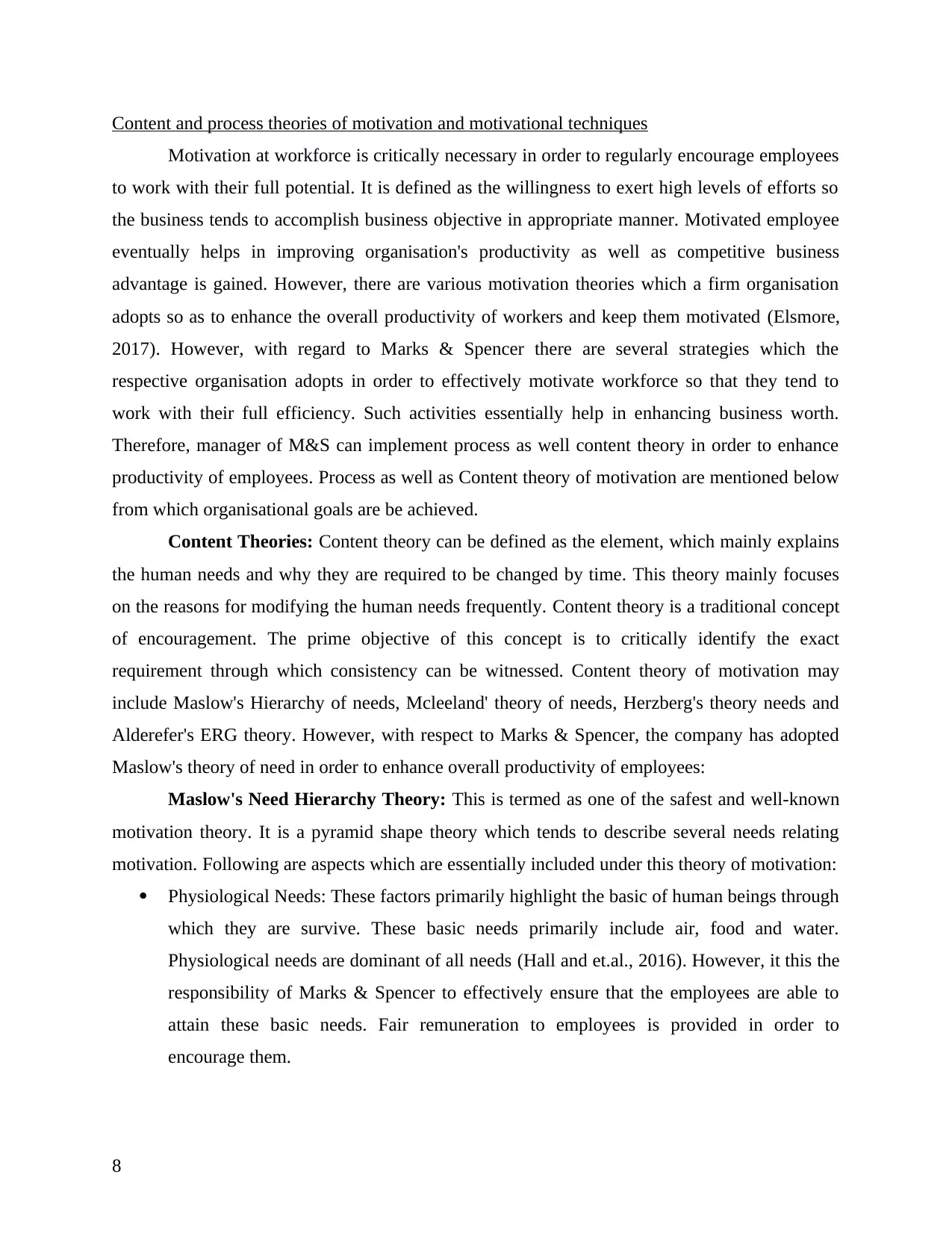
Content and process theories of motivation and motivational techniques
Motivation at workforce is critically necessary in order to regularly encourage employees
to work with their full potential. It is defined as the willingness to exert high levels of efforts so
the business tends to accomplish business objective in appropriate manner. Motivated employee
eventually helps in improving organisation's productivity as well as competitive business
advantage is gained. However, there are various motivation theories which a firm organisation
adopts so as to enhance the overall productivity of workers and keep them motivated (Elsmore,
2017). However, with regard to Marks & Spencer there are several strategies which the
respective organisation adopts in order to effectively motivate workforce so that they tend to
work with their full efficiency. Such activities essentially help in enhancing business worth.
Therefore, manager of M&S can implement process as well content theory in order to enhance
productivity of employees. Process as well as Content theory of motivation are mentioned below
from which organisational goals are be achieved.
Content Theories: Content theory can be defined as the element, which mainly explains
the human needs and why they are required to be changed by time. This theory mainly focuses
on the reasons for modifying the human needs frequently. Content theory is a traditional concept
of encouragement. The prime objective of this concept is to critically identify the exact
requirement through which consistency can be witnessed. Content theory of motivation may
include Maslow's Hierarchy of needs, Mcleeland' theory of needs, Herzberg's theory needs and
Alderefer's ERG theory. However, with respect to Marks & Spencer, the company has adopted
Maslow's theory of need in order to enhance overall productivity of employees:
Maslow's Need Hierarchy Theory: This is termed as one of the safest and well-known
motivation theory. It is a pyramid shape theory which tends to describe several needs relating
motivation. Following are aspects which are essentially included under this theory of motivation:
Physiological Needs: These factors primarily highlight the basic of human beings through
which they are survive. These basic needs primarily include air, food and water.
Physiological needs are dominant of all needs (Hall and et.al., 2016). However, it this the
responsibility of Marks & Spencer to effectively ensure that the employees are able to
attain these basic needs. Fair remuneration to employees is provided in order to
encourage them.
8
Motivation at workforce is critically necessary in order to regularly encourage employees
to work with their full potential. It is defined as the willingness to exert high levels of efforts so
the business tends to accomplish business objective in appropriate manner. Motivated employee
eventually helps in improving organisation's productivity as well as competitive business
advantage is gained. However, there are various motivation theories which a firm organisation
adopts so as to enhance the overall productivity of workers and keep them motivated (Elsmore,
2017). However, with regard to Marks & Spencer there are several strategies which the
respective organisation adopts in order to effectively motivate workforce so that they tend to
work with their full efficiency. Such activities essentially help in enhancing business worth.
Therefore, manager of M&S can implement process as well content theory in order to enhance
productivity of employees. Process as well as Content theory of motivation are mentioned below
from which organisational goals are be achieved.
Content Theories: Content theory can be defined as the element, which mainly explains
the human needs and why they are required to be changed by time. This theory mainly focuses
on the reasons for modifying the human needs frequently. Content theory is a traditional concept
of encouragement. The prime objective of this concept is to critically identify the exact
requirement through which consistency can be witnessed. Content theory of motivation may
include Maslow's Hierarchy of needs, Mcleeland' theory of needs, Herzberg's theory needs and
Alderefer's ERG theory. However, with respect to Marks & Spencer, the company has adopted
Maslow's theory of need in order to enhance overall productivity of employees:
Maslow's Need Hierarchy Theory: This is termed as one of the safest and well-known
motivation theory. It is a pyramid shape theory which tends to describe several needs relating
motivation. Following are aspects which are essentially included under this theory of motivation:
Physiological Needs: These factors primarily highlight the basic of human beings through
which they are survive. These basic needs primarily include air, food and water.
Physiological needs are dominant of all needs (Hall and et.al., 2016). However, it this the
responsibility of Marks & Spencer to effectively ensure that the employees are able to
attain these basic needs. Fair remuneration to employees is provided in order to
encourage them.
8
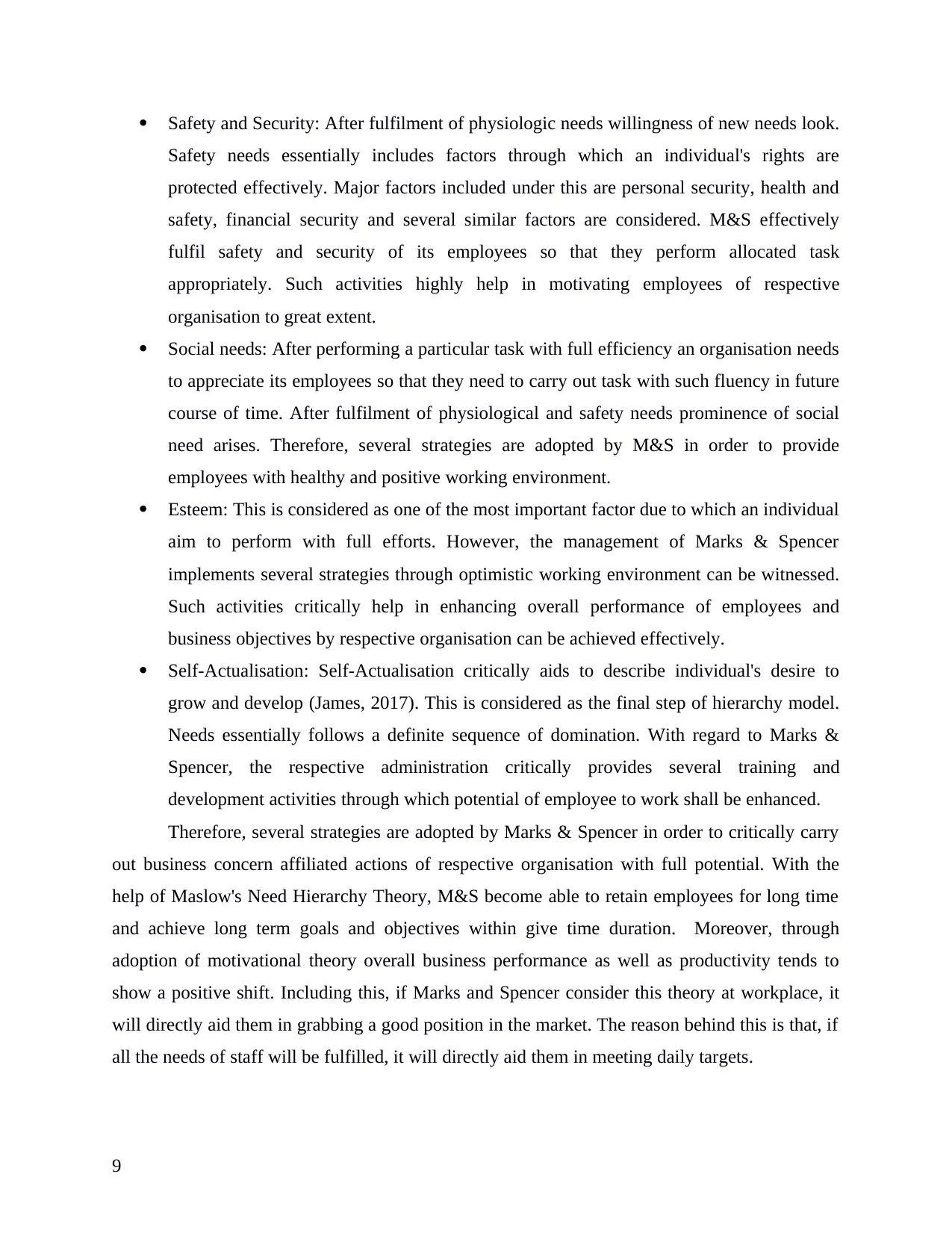
Safety and Security: After fulfilment of physiologic needs willingness of new needs look.
Safety needs essentially includes factors through which an individual's rights are
protected effectively. Major factors included under this are personal security, health and
safety, financial security and several similar factors are considered. M&S effectively
fulfil safety and security of its employees so that they perform allocated task
appropriately. Such activities highly help in motivating employees of respective
organisation to great extent.
Social needs: After performing a particular task with full efficiency an organisation needs
to appreciate its employees so that they need to carry out task with such fluency in future
course of time. After fulfilment of physiological and safety needs prominence of social
need arises. Therefore, several strategies are adopted by M&S in order to provide
employees with healthy and positive working environment.
Esteem: This is considered as one of the most important factor due to which an individual
aim to perform with full efforts. However, the management of Marks & Spencer
implements several strategies through optimistic working environment can be witnessed.
Such activities critically help in enhancing overall performance of employees and
business objectives by respective organisation can be achieved effectively.
Self-Actualisation: Self-Actualisation critically aids to describe individual's desire to
grow and develop (James, 2017). This is considered as the final step of hierarchy model.
Needs essentially follows a definite sequence of domination. With regard to Marks &
Spencer, the respective administration critically provides several training and
development activities through which potential of employee to work shall be enhanced.
Therefore, several strategies are adopted by Marks & Spencer in order to critically carry
out business concern affiliated actions of respective organisation with full potential. With the
help of Maslow's Need Hierarchy Theory, M&S become able to retain employees for long time
and achieve long term goals and objectives within give time duration. Moreover, through
adoption of motivational theory overall business performance as well as productivity tends to
show a positive shift. Including this, if Marks and Spencer consider this theory at workplace, it
will directly aid them in grabbing a good position in the market. The reason behind this is that, if
all the needs of staff will be fulfilled, it will directly aid them in meeting daily targets.
9
Safety needs essentially includes factors through which an individual's rights are
protected effectively. Major factors included under this are personal security, health and
safety, financial security and several similar factors are considered. M&S effectively
fulfil safety and security of its employees so that they perform allocated task
appropriately. Such activities highly help in motivating employees of respective
organisation to great extent.
Social needs: After performing a particular task with full efficiency an organisation needs
to appreciate its employees so that they need to carry out task with such fluency in future
course of time. After fulfilment of physiological and safety needs prominence of social
need arises. Therefore, several strategies are adopted by M&S in order to provide
employees with healthy and positive working environment.
Esteem: This is considered as one of the most important factor due to which an individual
aim to perform with full efforts. However, the management of Marks & Spencer
implements several strategies through optimistic working environment can be witnessed.
Such activities critically help in enhancing overall performance of employees and
business objectives by respective organisation can be achieved effectively.
Self-Actualisation: Self-Actualisation critically aids to describe individual's desire to
grow and develop (James, 2017). This is considered as the final step of hierarchy model.
Needs essentially follows a definite sequence of domination. With regard to Marks &
Spencer, the respective administration critically provides several training and
development activities through which potential of employee to work shall be enhanced.
Therefore, several strategies are adopted by Marks & Spencer in order to critically carry
out business concern affiliated actions of respective organisation with full potential. With the
help of Maslow's Need Hierarchy Theory, M&S become able to retain employees for long time
and achieve long term goals and objectives within give time duration. Moreover, through
adoption of motivational theory overall business performance as well as productivity tends to
show a positive shift. Including this, if Marks and Spencer consider this theory at workplace, it
will directly aid them in grabbing a good position in the market. The reason behind this is that, if
all the needs of staff will be fulfilled, it will directly aid them in meeting daily targets.
9
⊘ This is a preview!⊘
Do you want full access?
Subscribe today to unlock all pages.

Trusted by 1+ million students worldwide
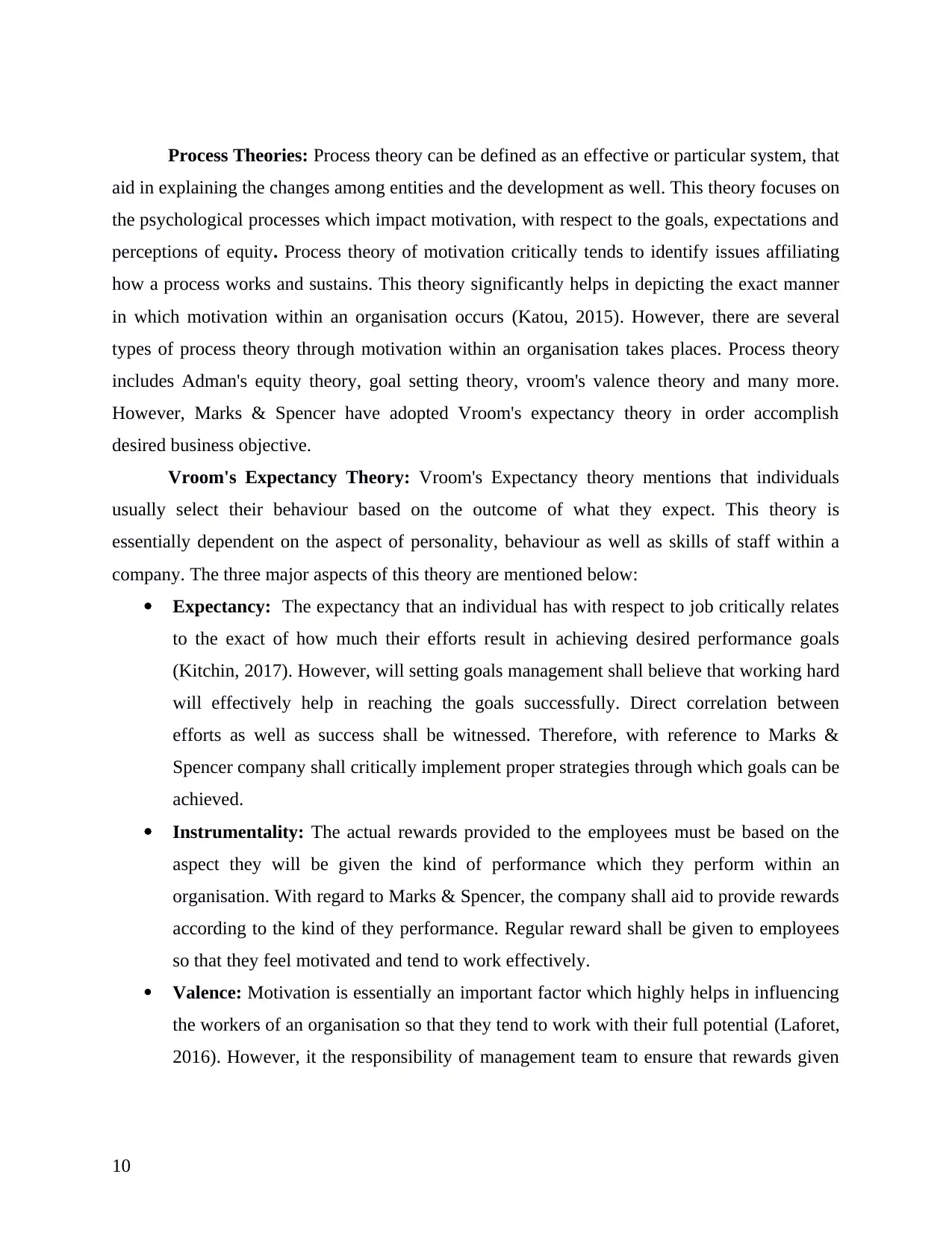
Process Theories: Process theory can be defined as an effective or particular system, that
aid in explaining the changes among entities and the development as well. This theory focuses on
the psychological processes which impact motivation, with respect to the goals, expectations and
perceptions of equity. Process theory of motivation critically tends to identify issues affiliating
how a process works and sustains. This theory significantly helps in depicting the exact manner
in which motivation within an organisation occurs (Katou, 2015). However, there are several
types of process theory through motivation within an organisation takes places. Process theory
includes Adman's equity theory, goal setting theory, vroom's valence theory and many more.
However, Marks & Spencer have adopted Vroom's expectancy theory in order accomplish
desired business objective.
Vroom's Expectancy Theory: Vroom's Expectancy theory mentions that individuals
usually select their behaviour based on the outcome of what they expect. This theory is
essentially dependent on the aspect of personality, behaviour as well as skills of staff within a
company. The three major aspects of this theory are mentioned below:
Expectancy: The expectancy that an individual has with respect to job critically relates
to the exact of how much their efforts result in achieving desired performance goals
(Kitchin, 2017). However, will setting goals management shall believe that working hard
will effectively help in reaching the goals successfully. Direct correlation between
efforts as well as success shall be witnessed. Therefore, with reference to Marks &
Spencer company shall critically implement proper strategies through which goals can be
achieved.
Instrumentality: The actual rewards provided to the employees must be based on the
aspect they will be given the kind of performance which they perform within an
organisation. With regard to Marks & Spencer, the company shall aid to provide rewards
according to the kind of they performance. Regular reward shall be given to employees
so that they feel motivated and tend to work effectively.
Valence: Motivation is essentially an important factor which highly helps in influencing
the workers of an organisation so that they tend to work with their full potential (Laforet,
2016). However, it the responsibility of management team to ensure that rewards given
10
aid in explaining the changes among entities and the development as well. This theory focuses on
the psychological processes which impact motivation, with respect to the goals, expectations and
perceptions of equity. Process theory of motivation critically tends to identify issues affiliating
how a process works and sustains. This theory significantly helps in depicting the exact manner
in which motivation within an organisation occurs (Katou, 2015). However, there are several
types of process theory through motivation within an organisation takes places. Process theory
includes Adman's equity theory, goal setting theory, vroom's valence theory and many more.
However, Marks & Spencer have adopted Vroom's expectancy theory in order accomplish
desired business objective.
Vroom's Expectancy Theory: Vroom's Expectancy theory mentions that individuals
usually select their behaviour based on the outcome of what they expect. This theory is
essentially dependent on the aspect of personality, behaviour as well as skills of staff within a
company. The three major aspects of this theory are mentioned below:
Expectancy: The expectancy that an individual has with respect to job critically relates
to the exact of how much their efforts result in achieving desired performance goals
(Kitchin, 2017). However, will setting goals management shall believe that working hard
will effectively help in reaching the goals successfully. Direct correlation between
efforts as well as success shall be witnessed. Therefore, with reference to Marks &
Spencer company shall critically implement proper strategies through which goals can be
achieved.
Instrumentality: The actual rewards provided to the employees must be based on the
aspect they will be given the kind of performance which they perform within an
organisation. With regard to Marks & Spencer, the company shall aid to provide rewards
according to the kind of they performance. Regular reward shall be given to employees
so that they feel motivated and tend to work effectively.
Valence: Motivation is essentially an important factor which highly helps in influencing
the workers of an organisation so that they tend to work with their full potential (Laforet,
2016). However, it the responsibility of management team to ensure that rewards given
10
Paraphrase This Document
Need a fresh take? Get an instant paraphrase of this document with our AI Paraphraser
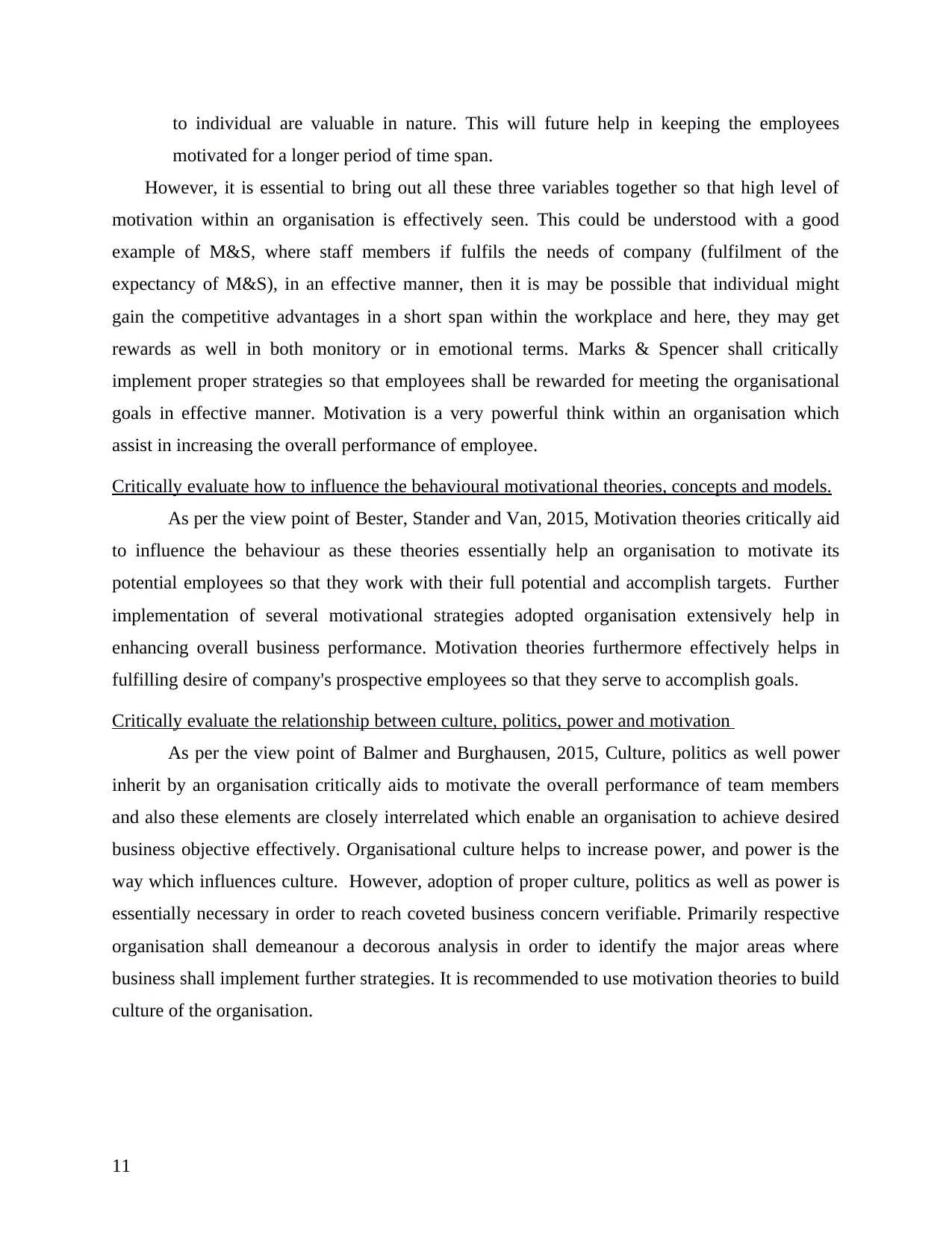
to individual are valuable in nature. This will future help in keeping the employees
motivated for a longer period of time span.
However, it is essential to bring out all these three variables together so that high level of
motivation within an organisation is effectively seen. This could be understood with a good
example of M&S, where staff members if fulfils the needs of company (fulfilment of the
expectancy of M&S), in an effective manner, then it is may be possible that individual might
gain the competitive advantages in a short span within the workplace and here, they may get
rewards as well in both monitory or in emotional terms. Marks & Spencer shall critically
implement proper strategies so that employees shall be rewarded for meeting the organisational
goals in effective manner. Motivation is a very powerful think within an organisation which
assist in increasing the overall performance of employee.
Critically evaluate how to influence the behavioural motivational theories, concepts and models.
As per the view point of Bester, Stander and Van, 2015, Motivation theories critically aid
to influence the behaviour as these theories essentially help an organisation to motivate its
potential employees so that they work with their full potential and accomplish targets. Further
implementation of several motivational strategies adopted organisation extensively help in
enhancing overall business performance. Motivation theories furthermore effectively helps in
fulfilling desire of company's prospective employees so that they serve to accomplish goals.
Critically evaluate the relationship between culture, politics, power and motivation
As per the view point of Balmer and Burghausen, 2015, Culture, politics as well power
inherit by an organisation critically aids to motivate the overall performance of team members
and also these elements are closely interrelated which enable an organisation to achieve desired
business objective effectively. Organisational culture helps to increase power, and power is the
way which influences culture. However, adoption of proper culture, politics as well as power is
essentially necessary in order to reach coveted business concern verifiable. Primarily respective
organisation shall demeanour a decorous analysis in order to identify the major areas where
business shall implement further strategies. It is recommended to use motivation theories to build
culture of the organisation.
11
motivated for a longer period of time span.
However, it is essential to bring out all these three variables together so that high level of
motivation within an organisation is effectively seen. This could be understood with a good
example of M&S, where staff members if fulfils the needs of company (fulfilment of the
expectancy of M&S), in an effective manner, then it is may be possible that individual might
gain the competitive advantages in a short span within the workplace and here, they may get
rewards as well in both monitory or in emotional terms. Marks & Spencer shall critically
implement proper strategies so that employees shall be rewarded for meeting the organisational
goals in effective manner. Motivation is a very powerful think within an organisation which
assist in increasing the overall performance of employee.
Critically evaluate how to influence the behavioural motivational theories, concepts and models.
As per the view point of Bester, Stander and Van, 2015, Motivation theories critically aid
to influence the behaviour as these theories essentially help an organisation to motivate its
potential employees so that they work with their full potential and accomplish targets. Further
implementation of several motivational strategies adopted organisation extensively help in
enhancing overall business performance. Motivation theories furthermore effectively helps in
fulfilling desire of company's prospective employees so that they serve to accomplish goals.
Critically evaluate the relationship between culture, politics, power and motivation
As per the view point of Balmer and Burghausen, 2015, Culture, politics as well power
inherit by an organisation critically aids to motivate the overall performance of team members
and also these elements are closely interrelated which enable an organisation to achieve desired
business objective effectively. Organisational culture helps to increase power, and power is the
way which influences culture. However, adoption of proper culture, politics as well as power is
essentially necessary in order to reach coveted business concern verifiable. Primarily respective
organisation shall demeanour a decorous analysis in order to identify the major areas where
business shall implement further strategies. It is recommended to use motivation theories to build
culture of the organisation.
11
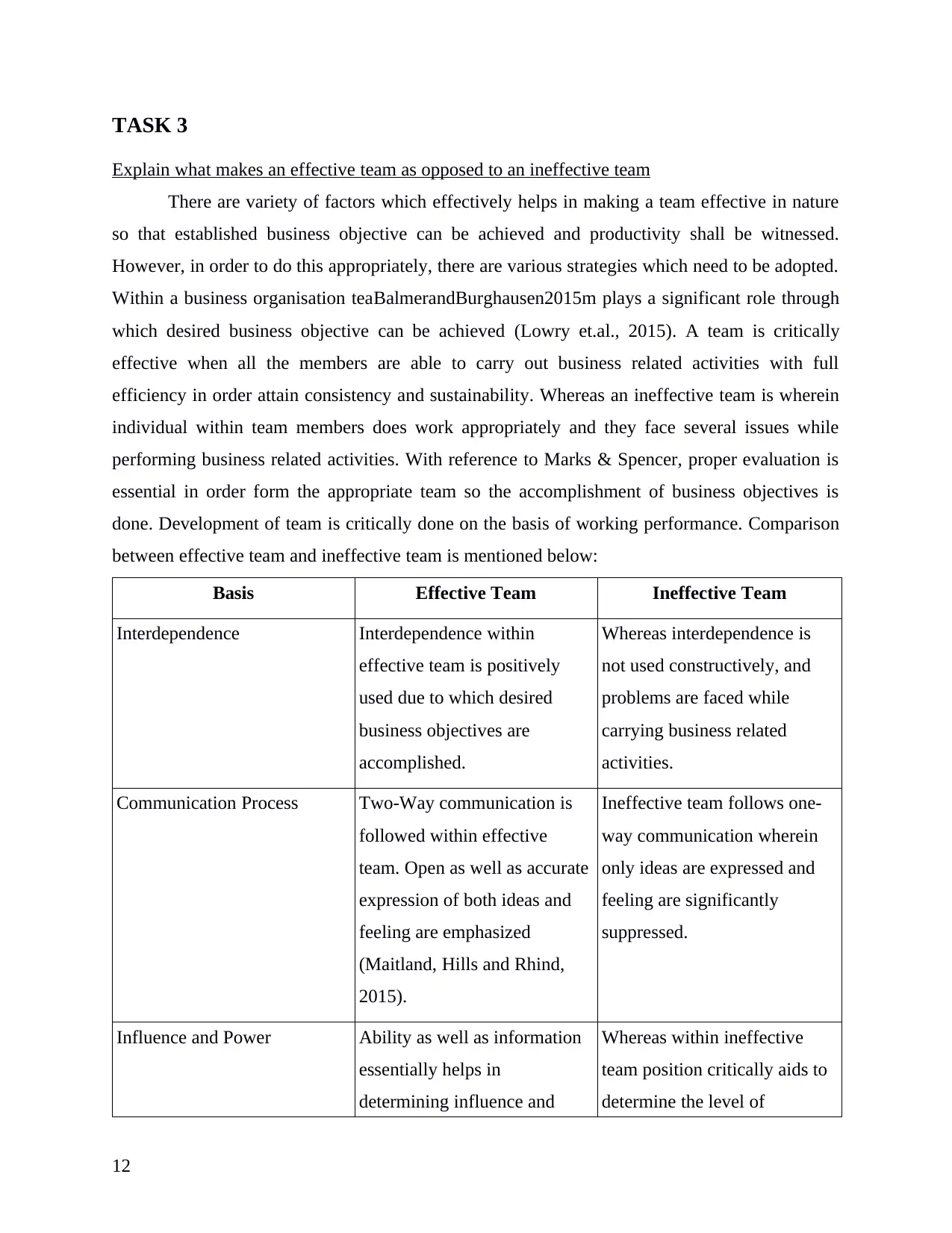
TASK 3
Explain what makes an effective team as opposed to an ineffective team
There are variety of factors which effectively helps in making a team effective in nature
so that established business objective can be achieved and productivity shall be witnessed.
However, in order to do this appropriately, there are various strategies which need to be adopted.
Within a business organisation teaBalmerandBurghausen2015m plays a significant role through
which desired business objective can be achieved (Lowry et.al., 2015). A team is critically
effective when all the members are able to carry out business related activities with full
efficiency in order attain consistency and sustainability. Whereas an ineffective team is wherein
individual within team members does work appropriately and they face several issues while
performing business related activities. With reference to Marks & Spencer, proper evaluation is
essential in order form the appropriate team so the accomplishment of business objectives is
done. Development of team is critically done on the basis of working performance. Comparison
between effective team and ineffective team is mentioned below:
Basis Effective Team Ineffective Team
Interdependence Interdependence within
effective team is positively
used due to which desired
business objectives are
accomplished.
Whereas interdependence is
not used constructively, and
problems are faced while
carrying business related
activities.
Communication Process Two-Way communication is
followed within effective
team. Open as well as accurate
expression of both ideas and
feeling are emphasized
(Maitland, Hills and Rhind,
2015).
Ineffective team follows one-
way communication wherein
only ideas are expressed and
feeling are significantly
suppressed.
Influence and Power Ability as well as information
essentially helps in
determining influence and
Whereas within ineffective
team position critically aids to
determine the level of
12
Explain what makes an effective team as opposed to an ineffective team
There are variety of factors which effectively helps in making a team effective in nature
so that established business objective can be achieved and productivity shall be witnessed.
However, in order to do this appropriately, there are various strategies which need to be adopted.
Within a business organisation teaBalmerandBurghausen2015m plays a significant role through
which desired business objective can be achieved (Lowry et.al., 2015). A team is critically
effective when all the members are able to carry out business related activities with full
efficiency in order attain consistency and sustainability. Whereas an ineffective team is wherein
individual within team members does work appropriately and they face several issues while
performing business related activities. With reference to Marks & Spencer, proper evaluation is
essential in order form the appropriate team so the accomplishment of business objectives is
done. Development of team is critically done on the basis of working performance. Comparison
between effective team and ineffective team is mentioned below:
Basis Effective Team Ineffective Team
Interdependence Interdependence within
effective team is positively
used due to which desired
business objectives are
accomplished.
Whereas interdependence is
not used constructively, and
problems are faced while
carrying business related
activities.
Communication Process Two-Way communication is
followed within effective
team. Open as well as accurate
expression of both ideas and
feeling are emphasized
(Maitland, Hills and Rhind,
2015).
Ineffective team follows one-
way communication wherein
only ideas are expressed and
feeling are significantly
suppressed.
Influence and Power Ability as well as information
essentially helps in
determining influence and
Whereas within ineffective
team position critically aids to
determine the level of
12
⊘ This is a preview!⊘
Do you want full access?
Subscribe today to unlock all pages.

Trusted by 1+ million students worldwide
1 out of 19
Related Documents
Your All-in-One AI-Powered Toolkit for Academic Success.
+13062052269
info@desklib.com
Available 24*7 on WhatsApp / Email
![[object Object]](/_next/static/media/star-bottom.7253800d.svg)
Unlock your academic potential
Copyright © 2020–2025 A2Z Services. All Rights Reserved. Developed and managed by ZUCOL.





